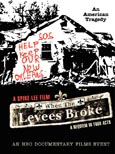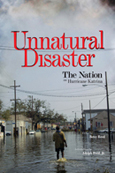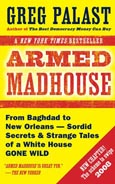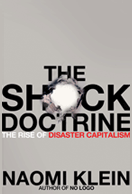The Shock Doctrine

Chapter 20: Disaster Apartheid
Links
"Vanishing City," February 2008
Link
Michelle Chen reports on the reconstruction efforts in New Orleans nearly two-and-a-half years after Hurricane Katrina.
Link
Michelle Chen reports on the reconstruction efforts in New Orleans nearly two-and-a-half years after Hurricane Katrina.
“10 Important Lessons: Katrina, Two Years Later,” August 2007
Link
Human rights lawyer Bill Quigley has outlined a vital list of ten lessons learned from Hurricane Katrina. These lessons are applicable for all future disasters and form a basis for people’s reconstruction. Essential reading.
Link
Human rights lawyer Bill Quigley has outlined a vital list of ten lessons learned from Hurricane Katrina. These lessons are applicable for all future disasters and form a basis for people’s reconstruction. Essential reading.
Pro-Free-Market Ideas for Responding to Hurricane Katrina and High Gas Prices, September 13, 2005
Link
Paul Teller, the deputy director of the U.S. House Republican Study Committee, circulated this outrageous wish list of free-market reforms just a few weeks after Hurricane Katrina. Some of the suggested reforms, such suspending tariffs on Canadian lumber and allowing drilling in the Arctic National Wildlife Refuge, have nothing to do with Hurricane Katrina.
Link
Paul Teller, the deputy director of the U.S. House Republican Study Committee, circulated this outrageous wish list of free-market reforms just a few weeks after Hurricane Katrina. Some of the suggested reforms, such suspending tariffs on Canadian lumber and allowing drilling in the Arctic National Wildlife Refuge, have nothing to do with Hurricane Katrina.
Milton Friedman, “The Promise of Vouchers,” December 2005
Link
In this editorial written only a few months after Hurricane Katrina hit, Milton Friedman states that the storm gave New Orleans “an opportunity to radically reform the educational system” and calls for replacing the public school system with an unpopular voucher program.
Link
In this editorial written only a few months after Hurricane Katrina hit, Milton Friedman states that the storm gave New Orleans “an opportunity to radically reform the educational system” and calls for replacing the public school system with an unpopular voucher program.
Disposable Workforce in New Orleans, October 2007
Link
The AFL-CIO presents an overview on the effects of union busting and privatization efforts in New Orleans following Hurricane Katrina.
Link
The AFL-CIO presents an overview on the effects of union busting and privatization efforts in New Orleans following Hurricane Katrina.
“Fighting for the Right to Learn in New Orleans,” August 2007
Link
Bill Quigley discusses the undemocratic “mass experiment” that New Orleans is undertaking by converting many of its traditional public schools into charter schools.
Link
Bill Quigley discusses the undemocratic “mass experiment” that New Orleans is undertaking by converting many of its traditional public schools into charter schools.
“How to Destroy an African-American City in 33 Steps,” June 2007
Link
In this overview, Bill Quigley highlights the various ways that federal and local authorities failed New Orleans.
Link
In this overview, Bill Quigley highlights the various ways that federal and local authorities failed New Orleans.
“Undone by Neoliberalism,” August 2006
Link
Political scientist Adolph Reed Jr. catalogs the neoliberal reforms made in the wake of Hurricane Katrina and concludes that “the storm exposed the consequences of neoliberalism's lies and mystifications, in a single locale and all at once.”
Link
Political scientist Adolph Reed Jr. catalogs the neoliberal reforms made in the wake of Hurricane Katrina and concludes that “the storm exposed the consequences of neoliberalism's lies and mystifications, in a single locale and all at once.”
Documents
Blueprint for Gulf Renewal, August/September 2007
Link
Gulf Coast Reconstruction Watch assesses the reconstruction efforts on the Gulf Coast and presents an action agenda to effectively rebuild the area, including ways to save public housing, strengthen schools, and create more contractor oversight.
Link
Gulf Coast Reconstruction Watch assesses the reconstruction efforts on the Gulf Coast and presents an action agenda to effectively rebuild the area, including ways to save public housing, strengthen schools, and create more contractor oversight.
New Orleans Community Leaders Attend Reconstruction Seminar in Thailand, November 2006
Link
The Asian Coalition for Housing Rights gathered 10 community leaders from New Orleans, 157 community leaders from 9 Asian countries, and representatives from the UN, the Thai government and Thai NGOs to discuss sustainable, community-based disaster recovery efforts. Inspirational reading.
Link
The Asian Coalition for Housing Rights gathered 10 community leaders from New Orleans, 157 community leaders from 9 Asian countries, and representatives from the UN, the Thai government and Thai NGOs to discuss sustainable, community-based disaster recovery efforts. Inspirational reading.
New Orleans Residents Tour Asian Tsunami Areas, September 2006
Link
Five New Orleans activists discussed community-based reconstruction with tsunami survivors in Thailand and Aceh. This inspirational document contains fantastic photos and notes from the international exchange.
Link
Five New Orleans activists discussed community-based reconstruction with tsunami survivors in Thailand and Aceh. This inspirational document contains fantastic photos and notes from the international exchange.
Jamie Peck, "Liberating the City: Between New York and New Orleans," November/December 2006
Link
This article in Urban Geography concludes that "the neoliberal makeover of the Gulf Coast is being guided by an ideational program manufactured on, and managed from, the East Coast—a first-world form of structural adjustment."
Link
This article in Urban Geography concludes that "the neoliberal makeover of the Gulf Coast is being guided by an ideational program manufactured on, and managed from, the East Coast—a first-world form of structural adjustment."
‘National Model’ or Flawed Approach? The Post-Katrina New Orleans Public Schools, November 2006
Link
The American Federation of Teachers assesses the public school system fifteen months after Hurricane Katrina.
Link
The American Federation of Teachers assesses the public school system fifteen months after Hurricane Katrina.
Waste, Fraud and Abuse in Hurricane Katrina Contracts, August 2006
Link
This U.S. congressional report critiques the reconstruction on the Gulf Coast and concludes that “19 Katrina contracts collectively worth $8.75 billion that have been plagued by waste, fraud, abuse, or mismanagement.”
Link
This U.S. congressional report critiques the reconstruction on the Gulf Coast and concludes that “19 Katrina contracts collectively worth $8.75 billion that have been plagued by waste, fraud, abuse, or mismanagement.”
Big, Easy Money: Disaster Profiteering on the American Gulf Coast, August 2006
Link
Released on the one-year anniversary of Hurricane Katrina, this CorpWatch report also details wasteful contractor spending and delayed reconstruction work on the Gulf Coast.
Link
Released on the one-year anniversary of Hurricane Katrina, this CorpWatch report also details wasteful contractor spending and delayed reconstruction work on the Gulf Coast.
FEMA Chief's Inappropriate Emails During Hurricane Katrina, August/September 2005
Link
On the day the levees broke in New Orleans, FEMA Chief Michael Brown asked in an email “Can I quit now? Can I go home?” Read Brown’s emails, in which he discussed not only the unfolding crisis but also his wardrobe attire (“Tie or not for tonight? Button down blue shirt?”).
Link
On the day the levees broke in New Orleans, FEMA Chief Michael Brown asked in an email “Can I quit now? Can I go home?” Read Brown’s emails, in which he discussed not only the unfolding crisis but also his wardrobe attire (“Tie or not for tonight? Button down blue shirt?”).

















